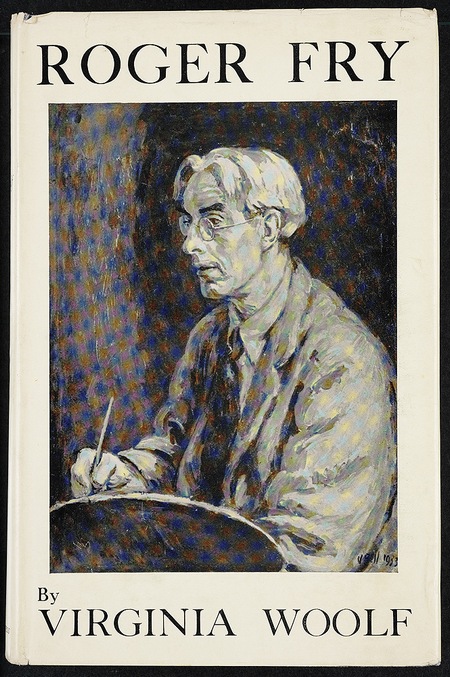.jpg/240px-Virginia_Woolf_by_George_Charles_Beresford_(1902).jpg) |
| Virginia Woolf (photographed in 1902) by George Charles Beresford Source: Wikipedia |
Last Saturday I travelled down to London for the annual Virginia Woolf birthday lecture organised by the Virginia Woolf Society of Great Britain. Fittingly, the event was held in the Keynes Library at 43 Gordon Square, complete with Vanessa Bell paintings looking down upon the audience from the rather grand walls. There was birthday cake and champagne, and a fascinating lecture by Michael Whitworth on the topic of ‘Virginia Woolf, Fame and Gloire’.
Whitworth traced the nuances of fame, reputation and ‘afterlives’ as debated and explored in Woolf’s fiction, essays and her correspondence with Logan Pearsall Smith. Ranging from Night and Day to Between the Acts -- and taking in Jacob’s Room, To The Lighthouse and Orlando along the way -- Whitworth teased out the multiple meanings of fame and longevity in Woolf’s work. What is the relationship between the celebrity of an author and the value of a text? Is fame to be measured in terms of money, revenue and sales? Or is it the product of genius and the result of a lasting work of art? And where is the book as physical object in all this? What is the relationship, if any, between the preservation of pages and bindings, and preservation of a writers’ reputation?
An extended version of Whitworth’s lecture will soon be published and available to buy from the VWSGB, and I look forward to getting my hands on a copy. As a life-writing researcher, I was intrigued by the questions raised and Whitworth’s exploration of the relationship between authors (or author figures in fiction) and texts, between authors and books. For Whitworth, Logan Pearsall Smith -- with whom Woolf debated the issue of fame, defending modern writers against accusations of debased chasing after money -- provided the model for Nick Greene in Orlando (revising a critical tradition that would have Edmund Gosse as the template for this character). As readers, we are invited to suspect Nick Greene and his championing of ‘gloire’; he is vulgar, grotesque and his views seem detached from the realities of the writing and book trade, from the vitality of writing as it is practised now, with his head stuck firmly in the past. But the reference to Nick Greene set my mind to thinking about a different aspect of fame, reputation and ‘afterlives’…
 |
| Virginia Woolf, Roger Fry: A Biography (1940) Source: www.mantex.co.uk |
Nick Greene writes a satire of his patron Orlando; as such, the ‘gloire’ of his poem depends on the cannibalised reputation of another. Orlando as a novel is a mock-biography of Vita Sackville-West and much of its humour and playfulness depends on the reputation (and infamy) of its subject. While Woolf was writing Between the Acts and exploring the lastingness -- or rather, the “scraps, orts, and fragments” [1] -- of a work of art, she was also writing her life of Roger Fry, a book that would cause much difficulty in the writing, not least because of the responsibility she felt to friends and family to ‘capture’ Roger, yet also to preserve and protect his reputation. When dealing with his affair with her sister, Vanessa Bell, Woolf exclaimed: “What am I to say about you? […] Do give me some views; how to deal with love so that we’re not all blushing” [2].
In the case of Roger Fry, the fame and reputation of the biographer was intimately tied to, and responsible for, the fame and reputation of the biographical subject. It is striking, therefore, that Roger Fry is the most forgotten, most neglected of Woolf’s major works; it enjoys the least fame and the most doubted, the most questioned reputation. (It is, however, a fascinating biography offering a sensitive and experimental account of Fry’s life -- but this is an argument for another day.)
Literary biography is a pertinent genre for an exploration of fame and longevity: of text, of subject, of biographer. And thus, when the published version of Whitworth’s lecture arrives through my letterbox, I’ll be keen to see how its arguments relate to Woolf’s career-long interest in the writing of lives.
[1] Virginia Woolf, Between the Acts, ed. by Frank Kermode (Oxford: Oxford University Press, 2008), p. 169.
[2] Virginia Woolf to Vanessa Bell, 8 October 1938. Leave The Letters Till We’re Dead. The Letters of Virginia Woolf, Volume Six: 1936-1941, ed. by Nigel Nicolson and Joanne Trautmann (London: The Hogarth Press, 1980, p. 285.
No comments:
Post a Comment